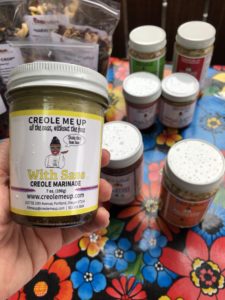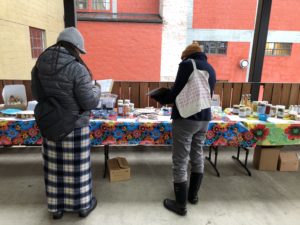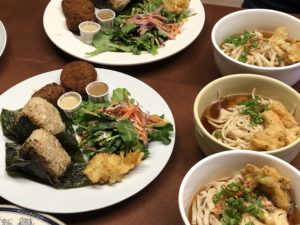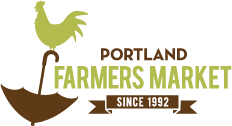You might think deep winter is a time when the Portland Farmers Market staff can take it easy and sleep in, with the office as fallow as the fields in February. However, just like the farmers sharpening their tools and pouring over seed orders and spreadsheets, PFM staff is busy planning and preparing to cultivate a different crop: new market entrepreneurs who apply to one of the 200+ spots in five markets. Building meaningful relationships with food system networks at all levels is their year-round mission.
Early each year this process begins anew.
On a recent afternoon, the PFM headquarters’ covered loading dock looked part gustatory research lab, part potluck of your dreams. Traditionally held in the conference room with the jurors arriving all at once, this year’s event was refashioned for COVID compliance, outside, with arrivals staggered to provide plenty of distancing. Tables were covered with dips, sauces and spreads of the vegan, cow, and goat variety; baked goods and candies that looked too good to share were portioned into sample sizes; fermented goods of every variety rounded out the selection. A sampling of cider, spirits, nut elixirs, coffee, teas, kombucha and sipping chocolate–all submitted by budding entrepreneurs hoping to join the food artisan incubator program–were served up fresh in front of each juror’s plexiglass-shielded tasting table. Each entry was also represented with its packaging, as jurors analyzed every aspect of a product’s future success.

Anyone with the dream of selling at a Portland Farmers Market can access a vendor interest form year-round, online, and in six languages, which encourages inclusive communities that contribute to the markets’ innovative status.
Applications are welcome from foragers and fishermen, ranchers and poulterers, growers of things edible and ornamental, cheesemakers, bakers, and specialty food producers. These last three groups–all food artisans creating unique products by hand–must adhere to strict sourcing and production standards. That means at least 25% of the ingredients used in the products must be sourced directly from small farms in Oregon and SW Washington. Producers who use wholesaler/third party distributors, outside packagers or GMOs are winnowed out during the first pass. This year out of 40 hopefuls that applied, 36 met these requirements and were invited to submit their products to the juried tasting event.

The atmosphere was relaxed but the focus intense, with enough time for palate breaks and kibitzing at a distance, as jurors worked in pairs, spaced an hour apart. Armed with clipboards, the juries are comprised of PFM board members, community partners, and long-time successful market food artisans. From the outside the process resembles judges considering ribbon placement at the county fair, but it also operates as a matchmaking service, and this is where the business acceleration opportunities start to come into play. Not everything was a hit with every jury member, but with such a diverse and experienced group there was always someone who could advocate for the obscure ingredient or unique preparation. Everyone came away with newfound knowledge and a very sated palate. This is one jury duty no one wants to avoid!
PFM Operations Director Amber Holland believes that the jurors, especially the vendors, are extremely valuable to the selection process.
“Existing vendors are in the market every week, they know what’s there and they know what shoppers look for. Many have been incubated by us. They had the idea, had the concept, went through the process, and are now in grocery stores or have their own restaurant. It’s a meaningful way to engage with them and get critical feedback.”
They also have a stake in the decision: they want to be in an environment where customers can shop with confidence knowing that all products meet the same standards of excellence. “If you sell veggies and you’re next to a really excellent hummus maker, you’ll sell more veggies,” she explains. She also values outsider perspectives because ultimately “people have to like the food.” While the flavor is the ultimate decider, jurors consider how a product might stand up to the more practical concerns like transportation, display, and sampling, stopping short of rejecting an item outright but rather sitting down between tastings to pen out caring critiques for later review.
The process is worth the effort for all applicants. Holland notes that “regardless of whether someone gets accepted to a market, they get the experience of having our jurors grade their product and share that information.” A handful of vendors reapply until they get in, based on this process. She recounts how the now-famous national brand Honey Mama’s, a PFM incubator success story, applied three years in a row with three different product prototypes and then “nailed it.” She wants future applicants to know that while there are many steps involved, the process is not outside of anyone’s reach and “there is a benefit to putting yourself out there and seeing what comes back.”

After the last sampling spoon is washed and all comments are compiled and tallied, the staff ascertains if a business seems ready for the ups and downs of the market season and provides feedback on the essential P’s of food marketing: price, portion, packaging, and presentation. Though producers can request a specific market placement in their application, careful consideration is given to make sure that vendors are the right fit.
It’s a process with no hard and fast rules, but rather a more nuanced approach honed over nearly thirty years of incubating small businesses and responding to consumer trends. Holland emphasizes that food artisans that support local growers is key, but she also wants to see “really cool and unique things, like right now the trend is plant-based products that are significantly better and less processed than what we’ve juried in the past. We’re excited to offer those.”
Plant-based, locally raised, distilled, baked, fermented–they can’t wait for you to meet every one of the 14 new vendors and their products! But first there are rules and regulations to review, provided in a very thorough and helpful 50-page Vendor Handbook, that while rigorous, assures that vendors are ready for anything and can focus on engaging with shoppers. Then they’ll participate in a group orientation where they have the opportunity to meet members of their new market community.
When their first market day bell rings it will represent graduation from the rigorous application process and the beginning of what PFM strives to help foster; a prosperous, fulfilling, and expansive future as a successful small business.
